#business automation tools
Explore tagged Tumblr posts
Text
10 Essential Features of Business Automation Software for ROI Optimization
As businesses grow, the need for streamlined operations, increased productivity, and effective resource management becomes paramount. In the ever-evolving landscape of business automation, the right software tools can transform how businesses manage tasks, track expenses, optimize workflow, and engage with customers. TrackOlap, an innovative solution for businesses aiming to optimize ROI, provides an all-in-one platform with a variety of features that help maximize operational efficiency. Let’s explore the ten essential features of TrackOlap’s business automation software that ensure ROI optimization.

1. Field Employees Expense Tracking For Cost Management
One of the critical aspects of business automation is efficiently managing the expenses associated with field employees. TrackOlap’s expense tracking tool allows businesses to monitor and manage expenses on the go, minimizing manual paperwork and reducing the chances of errors. Field employees can submit their expenses in real-time, including transportation, food, and other costs incurred during their tasks.
By automating this process, businesses can have up-to-the-minute visibility into spending, ensuring that budgets are adhered to and unnecessary expenses are flagged. This real-time expense tracking software not only saves time but also prevents fraud or discrepancies in financial reporting, helping businesses optimize their spending and maximize ROI.
2. Attendance Management for Improved Productivity
Tracking employee attendance is crucial for effective resource management, especially in large organizations with remote or field teams. TrackOlap’s automated attendance management system ensures that businesses can effortlessly monitor employee working hours and attendance without relying on manual logs.
This feature minimizes the risk of human error and potential issues like buddy punching (where one employee clocks in for another). Furthermore, by automating the attendance process, businesses can calculate payroll more accurately and ensure that employees are compensated for the correct amount of work, thus contributing to overall financial efficiency.
3. Task Automation for Efficiency
Task automation is at the heart of modern business processes. TrackOlap’s task automation feature streamlines repetitive or time-consuming tasks, freeing up employees to focus on higher-value activities. Whether it's assigning tasks, following up on specific deadlines, or initiating workflows automation reduces the risk of delays and ensures that everything is executed efficiently.
With task automation, businesses can set up triggers that automatically initiate actions based on specific conditions. For example, a customer inquiry can trigger an automatic email response, or a specific task could be assigned to an employee as soon as a certain condition is met. This reduces the administrative burden and helps ensure tasks are completed on time, optimizing business efficiency.
4. Auto Lead Assignment for Sales Optimization
For sales teams, efficiently managing leads is crucial for optimizing conversion rates and revenue generation. TrackOlap offers auto lead assignment feature that helps sales teams work more efficiently by automatically distributing leads to the appropriate team members based on predefined criteria. This system eliminates the risk of leads falling through the cracks or being assigned to the wrong person.
With this feature, businesses can ensure that leads are acted upon promptly, improving customer satisfaction and increasing the likelihood of conversions. The result is a more streamlined and organized sales process, leading to higher sales and ultimately a better return on investment.
5. Beat Planning for Field Force Efficiency
In industries where field sales representatives or agents need to follow specific routes and schedules (such as retail or distribution), beat planning is essential. TrackOlap’s beat planning feature enables businesses to plan, optimize, and track the daily or weekly routes of their field staff. This feature allows managers to design the most efficient routes, saving time, reducing fuel costs, and improving the overall productivity of field agents.
Beat planning can also integrate with other tools, such as GPS tracking, to ensure that employees follow their routes accurately. This coordination results in less time spent on the road and more time spent interacting with customers, thereby maximizing sales opportunities and improving ROI.
6. Employee Location Tracking for Improved Oversight
For businesses with field teams, employee location tracking is a crucial feature. TrackOlap offers Field Sales Automation Software, enabling managers to know the exact location of their field employees. This tool ensures that employees are following their planned routes and performing their tasks as expected.
This feature not only improves accountability but also enhances safety, as managers can monitor employees' movements in real-time. Additionally, location tracking helps in resource allocation—if an employee is near a location requiring attention, the manager can quickly assign them to the task. Ultimately, this contributes to better customer service and increased productivity, driving a positive impact on ROI.
7. Automation Workflow for Seamless Operations
Managing workflows manually can be cumbersome and prone to delays, especially when it involves multiple teams or departments. Workflow automation allows businesses to automate complex workflows, reducing the risk of miscommunication or missed deadlines.
TrackOlap’s workflow automation feature allows businesses to set up workflows that automatically move tasks through various stages, ensuring that all steps are completed in a timely manner. For example, once an employee submits an expense report, the system can automatically route it for approval and then to accounting for processing. By automating these steps, businesses can improve efficiency, reduce delays, and increase the speed at which tasks are completed, ultimately optimizing ROI.
8. Real-Time Analytics for Data-Driven Decisions
One of the key drivers of business optimization is data. TrackOlap’s real-time analytics feature provides businesses with the ability to track and analyze various aspects of their operations as they happen. Whether it’s employee performance, sales figures, expenses, or customer feedback, real-time analytics provides insights into the current state of business operations.
With this data at their fingertips, businesses can make informed decisions quickly, adjust strategies as needed, and identify potential problems before they escalate. Real-time analytics enable managers to identify trends, evaluate performance, and optimize resources, leading to better business outcomes and a higher return on investment.
9. Performance Tracking
TrackOlap’s performance tracking feature allows businesses to measure employee performance across a variety of parameters, such as productivity, task completion, and customer interactions. This feature helps managers set realistic goals and KPIs (Key Performance Indicators) for their teams while tracking progress over time.
By automating the performance tracking process, businesses can easily identify high performers who contribute to the success of the company, as well as areas for improvement. This feedback allows managers to provide targeted coaching, adjust workloads, and ultimately drive performance, leading to improved results and enhanced ROI.
10. Customizable Dashboards
Every business has unique needs, and TrackOlap’s customizable dashboards allow businesses to create personalized views of the most critical metrics. Managers and executives can set up dashboards that display only the information relevant to their role, whether it’s expense reports, lead conversion rates, or employee performance.
Customizable dashboards help businesses stay focused on what matters most, enabling quick access to important data and facilitating faster decision-making. This tailored approach helps businesses optimize their resources and make data-driven decisions, contributing to a more productive operation and a stronger ROI.
Conclusion
In today’s competitive business environment, automation software is no longer a luxury—it's a necessity. TrackOlap’s suite of features empowers businesses to automate time-consuming tasks, monitor performance, optimize workflow, and gain real-time insights into their operations. Whether it's field employee expense tracking, task automation, or real-time analytics, each feature is designed to streamline processes, improve efficiency, and increase profitability.
By adopting business automation software like TrackOlap, businesses can maximize productivity, reduce operational costs, and ensure that resources are utilized in the most efficient way possible. This not only optimizes day-to-day operations but also drives ROI by providing businesses with the tools they need to make informed decisions, improve performance, and grow their bottom line.
With the right business automation software, businesses can unlock new levels of productivity and efficiency—transforming their operations and maximizing return on investment for long-term success.
#business automation tools#business automation solutions#small business automation#workflow automation solution#workflow automation#workflow automation app
0 notes
Text
Leverage the power of AI with VastEdge’s intelligent solutions for automation, analytics, and business growth.
#artificial intelligence solutions#AI software#business automation tools#machine learning#AI analytics#AI-powered business
0 notes
Text
#All-in-one business platform#Online business tools#Systeme.io review#Sales funnel builder#Affiliate marketing software#Email marketing automation#Digital product sales#Online course platform#Website builder for entrepreneurs#Business automation tools#Marketing automation software#E-commerce solutions#Easy-to-use business software#Affordable online business tools#Membership site creation#Blogging platform#Webinar hosting software#Remote team tools#Entrepreneur success stories#Online business growth strategies
0 notes
Text
Whatsapp Automation Tool Business Automation Tools Whatsapp Automation For Business KarvaTech
Use KarvaTech Automation tools to put your business on auto-pilot. KarvaTech is here to guide you through the process. Our team of experts will work closely with you to understand your needs, recommend the right tools, and tailor solutions to your unique business processes."
0 notes
Text
Boost Your Business with These AI Tools: 9 Essential Tools for Success
In the epoch of digital metamorphosis, the utilization of artificial intelligence (AI) tools propels companies to a heightened competitive edge. According to the HubSpot’s State of AI report, a remarkable 68% of industry leaders express intense optimism concerning AI’s aptness to expand their enterprises. This figure elucidates the profound significance of integrating AI tools into business…

View On WordPress
#AI business tools#Artificial intelligence software#Boosting business with AI#Business automation tools
0 notes
Text
Boost Your Outreach with the Best Cold Email Automation Tool in the USA
In today’s competitive business landscape, effective communication is key to building relationships and driving sales. One powerful method for achieving this is through cold email automation. By leveraging advanced tools, businesses can streamline their outreach efforts, save time, and improve response rates.
Why Cold Email Automation?
Cold email automation is essential for scaling outreach efforts. Instead of manually sending emails to prospects, automation tools handle this task efficiently, allowing you to focus on crafting compelling messages and targeting the right audience. This not only boosts productivity but also ensures that your emails reach a wider audience.
Choosing the Best Cold Email Automation Tool
When selecting a cold email automation tool in the USA, consider the following features:
User-Friendly Interface: The tool should be easy to use, with a clear dashboard and intuitive features.
Customization Options: Look for tools that allow you to personalize your emails, which is crucial for engagement.
Analytics and Reporting: Comprehensive analytics help you track open rates, click-through rates, and responses, enabling you to refine your strategy.
Integration Capabilities: Ensure the tool can integrate with your existing CRM and other marketing platforms.
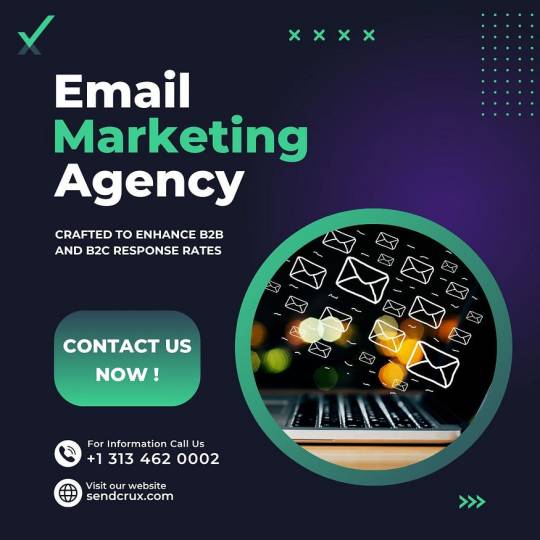
Best SMTP for Cold Email
To maximize the effectiveness of your cold email campaigns, it’s crucial to use the best SMTP (Simple Mail Transfer Protocol) for cold email. A reliable SMTP service ensures your emails are delivered promptly and securely, reducing the risk of your messages ending up in spam folders. This enhances deliverability and ensures your outreach efforts are not wasted.
Benefits of Using an Email Marketing Platform
An email marketing platform that includes cold email automation and the best SMTP for cold email provides several benefits:
Efficiency: Automate repetitive tasks and manage large-scale email campaigns with ease.
Personalization: Tailor your messages to individual recipients, increasing the likelihood of engagement.
Scalability: Handle a growing list of contacts without compromising on quality or performance.
Conclusion
In conclusion, boosting your outreach with the best cold email automation tool in the USA is a smart strategy for any business looking to expand its reach and drive sales. By leveraging the right tools, including a reliable SMTP service and a comprehensive email marketing platform, you can enhance your email campaigns and achieve better results. Start automating your cold emails today and watch your outreach efforts soar.
Visit: www.sendcrux.com
#best cold email marketing agency in the USA#Unlimited email sender USA#bulk email sender USA#Email Marketing#Bulk Emails#SMTP for cold email#cold email automation software#Small Business#Email Automation#Automation Tools#content marketing#Digital Marketing#Marketing Strategy#Email Strategy#Email campaigns#lead generation#bulk email verifier tool#cold email SMTP#email verifier software#email sender#B2B lead generation#bulk email verifier
4 notes
·
View notes
Text
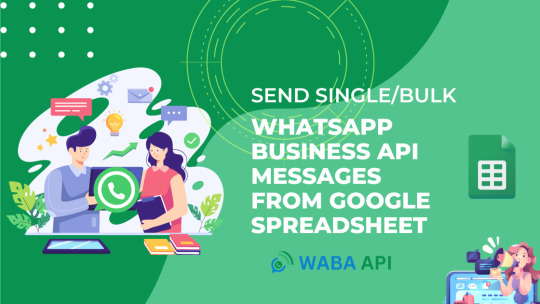
Send WhatsApp from Google Spreadsheet: Automated Messaging Made Easy
https://www.smsgatewaycenter.com/integrations/send-whatsapp-from-google-spreadsheet/
Discover the power of automated WhatsApp messaging directly from Google Sheets with our Send WhatsApp from Google Spreadsheet add-on. Effortlessly send notifications, engage clients, and customize messages with your wabaapi.com subscription. Installation and training included.
#SMSGatewayCenter#SMS Gateway Center#WhatsApp Google Spreadsheet Add-on#Automated WhatsApp Messaging#Google Sheets WhatsApp Integration#wabaapi WhatsApp Service#Business Communication Tool#Automated Client Messaging#Customizable WhatsApp Messages#Google Sheets Add-ons#WhatsApp Bulk Messaging
5 notes
·
View notes
Text
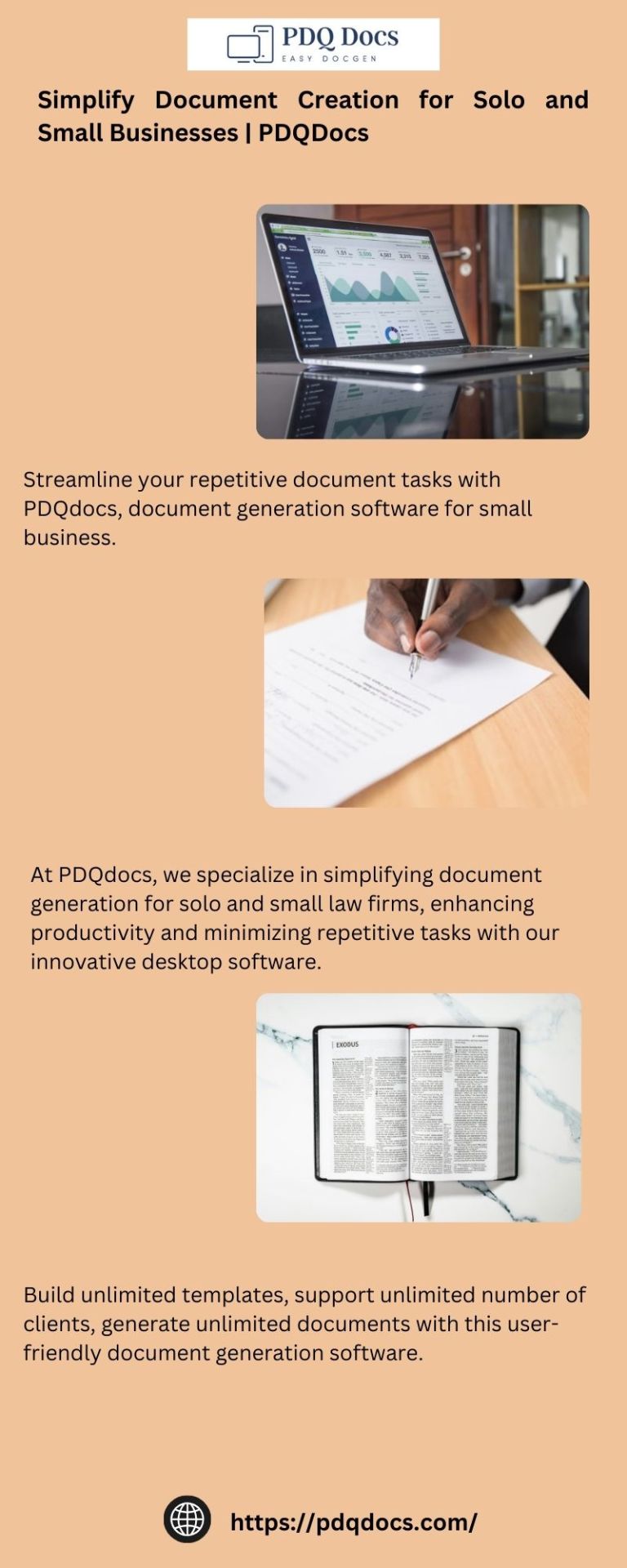
Automate Your Document Generation: PDQ Docs Streamline your repetitive document tasks with PDQdocs, document generation software for small business. Originally designed for estate planning document generation, PDQDocs works for any small business with repetitive document generation needs. For more visit: https://pdqdocs.com/
#document automation software for small business#small business document management#affordable document automation#automated document generation for small businesses#small business workflow automation#simple document automation tools#easy to use document software for small business#document management#workflow automation#document generation
0 notes
Text
#Best workflow automation tools#Business process automation tools#Digital transformation with automation#Small business automation solutions
0 notes
Text
Revolutionize Your Operations: A Guide to Business Automation Tools in 2024
Introduction
In the ever-evolving landscape of business, staying competitive requires constant adaptation and innovation. One of the most transformative trends in recent years has been the integration of automation tools into various aspects of operations. As we step into 2024, the capabilities of these tools have reached new heights, offering businesses unprecedented efficiency, accuracy, and scalability. In this guide, we'll explore the latest and most advanced business automation tools that can revolutionize your operations and propel your organization into the future.
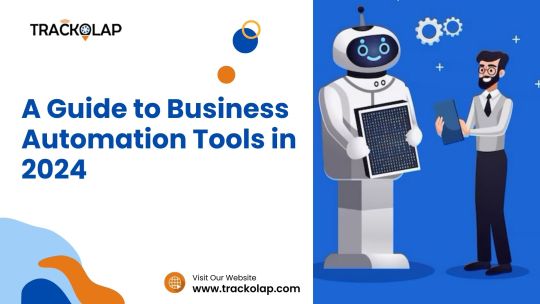
I. Understanding the Need for Automation
In today's fast-paced business environment, time is of the essence. Manual processes that were once the backbone of operations are now becoming bottlenecks, hindering growth and responsiveness. Automation addresses these challenges by streamlining repetitive tasks, with Task Automation Software, and freeing up valuable human resources for more strategic initiatives. The key is to identify areas within your organization where automation can make the most significant impact.
II. Workflow Automation: Seamless Collaboration
In the quest for enhanced productivity and collaboration, workflow automation tools are becoming increasingly sophisticated. 2024 will see a rise in solutions that not only automate individual tasks but entire business processes, from start to finish. These tools will streamline collaboration among team members, ensuring seamless communication and efficient project management.
Cloud-based Employee tracking software will become more prevalent, providing flexibility and accessibility to teams working remotely. Integration with other business applications will also be a key focus, as organizations seek a unified digital ecosystem that fosters agility and innovation. III. Intelligent Data Management
Data is the lifeblood of modern businesses, and managing it efficiently is crucial. In 2024, intelligent data management tools not only automate data entry and storage but also provide advanced analytics and insights. Machine learning algorithms can identify patterns, predict trends, and make data-driven recommendations, empowering organizations to make informed decisions and stay ahead of the competition.
IV. Increased Efficiency:
Automation eliminates manual, time-consuming tasks, allowing employees to focus on more strategic and creative aspects of their roles. This not only boosts productivity but also reduces the likelihood of errors associated with repetitive tasks.
V. Chatbots and Virtual Assistants
Customer service is a cornerstone of business success, and automation has revolutionized this aspect with the integration of chatbots and virtual assistants. These tools use natural language processing (NLP) and machine learning to understand and respond to customer inquiries. In 2024, they've become even more sophisticated, offering personalized interactions, understanding context, and seamlessly escalating complex issues to human agents when necessary. Implementing advanced chatbots and virtual assistants not only improves customer satisfaction but also allows your team to focus on more high-value tasks.
VI. Robotic Process Automation (RPA)
Robotic Process Automation (RPA) has been a game-changer for organizations looking to automate repetitive, rule-based tasks. In 2024, RPA has evolved to handle even more intricate processes. With improved integration capabilities, RPA tools can now work seamlessly with existing systems, orchestrating complex workflows across multiple applications. This not only reduces manual errors but also accelerates process execution, leading to faster and more accurate outcomes.
VII. Workflow Orchestration
As businesses grow, managing workflows becomes increasingly complex. Workflow orchestration tools in 2024 are designed to streamline and optimize end-to-end processes. These tools not only automate individual tasks but also coordinate the flow of information and activities across different departments. This ensures a seamless, interconnected operation that minimizes delays and enhances collaboration among team members.
VIII. Cybersecurity Automation
With the rising threat of cyberattacks, cybersecurity has become a top priority for businesses. In 2024, cybersecurity automation tools have become more sophisticated in detecting and responding to potential threats. Advanced machine learning algorithms can analyze patterns and anomalies in real-time, providing proactive defense mechanisms. Automated incident response capabilities help organizations mitigate the impact of security breaches, reducing the risk of data loss and downtime.
IX. Integration Platforms
In a landscape where businesses use a myriad of applications and systems, integration is key. Integration platforms in 2024 provide a centralized hub that connects disparate systems, ensuring seamless communication and data flow. These platforms support both on-premises and cloud-based applications, offering flexibility and scalability as businesses evolve. The ability to integrate various tools and systems into a cohesive ecosystem enhances overall efficiency and productivity.
X. Human Resources Automation
Managing human resources processes can be time-consuming, but with HR automation tools in 2024, organizations can streamline tasks such as recruitment, onboarding, performance management, and employee engagement. These tools automate administrative tasks, allowing HR professionals to focus on strategic initiatives that contribute to employee satisfaction and organizational success.
Conclusion
As we navigate the business landscape of 2024, automation tools have become indispensable for organizations striving to stay competitive and agile. From advanced process automation to intelligent data management, chatbots, RPA, cybersecurity tools, and more, the possibilities are vast. The key to successful implementation lies in identifying the specific needs of your organization and selecting the right combination of tools that align with your goals.
Revolutionizing your operations with automation isn't just about efficiency; it's about empowering your team to focus on innovation, creativity, and strategic decision-making. By embracing the latest automation tools, your organization can pave the way for a more agile, responsive, and successful future in the dynamic world of business.
#business automation solutions#small business automation#business growth#business strategy#crm for small business#business automation tools
0 notes
Text
5 Ways AI Orchestrators Can Reduce Employee Friction
New Post has been published on https://thedigitalinsider.com/5-ways-ai-orchestrators-can-reduce-employee-friction/
5 Ways AI Orchestrators Can Reduce Employee Friction


Employees are the lifeblood of every organization and keeping them content is crucial to ongoing success. Similarly, the rise of artificial intelligence in the workplace is not just about cutting-edge technology; it’s about people. AI’s potential to streamline tasks and boost efficiency is undeniable, with 78% of employees expecting some or most of their current tasks to be automated in the next two years.
However, the journey to full integration can create employee friction if not managed thoughtfully. Reducing this friction requires reframing AI implementation as a change management project. Instead of placing the responsibility for AI adoption solely on CIOs, organizations will benefit by creating a new role of AI orchestrator in 2025 to manage the relationship between AI and staff.
What Is an “AI Orchestrator?”
An AI orchestrator is the intermediary between technology and people that humanizes AI adoption. They align AI systems with organizational goals, while addressing employee concerns and needs. This role is not just technical; it incorporates change management, trust-building and workforce development.
AI orchestrators develop strategies for integrating AI into workflows, ensuring the technology supports employees rather than overwhelming them. Their responsibilities include managing how AI tools are implemented, training employees to work effectively alongside AI and creating transparent policies that foster trust.
This orchestrator role bridges the gap between innovation and employee experience in five primary ways to create a smoother, more collaborative workplace.
#1. Mitigating the Impact of AI on Employees and Morale
Introducing AI into an organization is more about managing cultural change than deploying new tools. Employees often worry about what AI means for their roles—whether it’s a threat to their job security or an opportunity for growth. Addressing these concerns head-on takes more than just reassurance and is critical for successful implementation, but 28% of companies struggle to address fears of AI-related layoffs effectively. Trust is the foundation of successful AI adoption, yet 43% of surveyed employees in the U.S. and Europe lack confidence in their employers’ ability to handle AI responsibly. AI orchestrators are fundamental in building faith by addressing concerns about job security and data transparency.
“The two biggest concerns I hear are: “Is this a threat to my job? How can this technology support me in my role?”
AI orchestrators can lessen these concerns by reframing AI as a tool to enhance, not replace, human work. By cultivating a culture of curiosity and empowerment, they can ensure employees see AI as a partner in their work, not a threat.
#2: Cultivating Trust Through Communication
To cultivate trust, AI orchestrators must clearly demonstrate how AI supports—rather than replaces—human roles. Proactive communication about new growth opportunities and redefining roles helps to alleviate fears and builds confidence. Data transparency is also a critical factor, because employees need to understand how AI systems make decisions and whether those decisions align with ethical principles.
AI orchestrators must implement clear policies on data governance, ensuring that the tools use reliable, unbiased data. They must also establish feedback loops that allow employees to provide input on AI systems, fostering a sense of ownership and confidence. Through transparent communication and robust change management, orchestrators can clarify how AI reduces mundane tasks, allowing employees to focus on higher-value activities and leave repetitive work to automation.
By openly discussing how AI supports rather than replaces jobs, organizations can also reduce fears of obsolescence. For example, rather than focusing solely on efficiency gains, orchestrators can highlight the opportunities AI creates for career growth and skill development. This shift improves job satisfaction and reduces burnout by redistributing workloads. Personalization carries a significant role here, as tailoring workflows and tasks to individual strengths and goals empowers employees and boosts morale.
#3. Driving Continuous Learning and AI Literacy
For AI to succeed, employees need the skills and confidence to work in tandem with intelligent systems. AI orchestrators can create a skills development framework to build employee proficiency and embed continuous learning into everyday workflows. Adaptive learning paths customized for individual roles, ability levels and career aspirations ensure that training is relevant and effective.
Micro-learning is an effective strategy—using short, contextual training sessions delivered in real time. For instance, if an employee encounters a new AI tool, the system can provide instant guidance, turning a moment of uncertainty into an opportunity for growth. AI orchestrators must also promote AI literacy at all organizational levels, demystifying complex technologies and making them accessible.
Additionally, an employee-first mindset is crucial. By offsetting automation with human-centric outcomes, AI orchestrators optimize the employee experience while driving operational efficiency. This alignment creates a win-win scenario where both the organization and its workforce can thrive.
#4. Aligning AI Integration With Broader Business Goals
To maximize the benefits of AI, an organization must align its adoption with their overarching goals. AI orchestrators play a strategic role in this process, ensuring that AI initiatives contribute to both employee well-being and business outcomes.
One key principle is outcome-driven design. AI orchestrators should focus on how AI can directly support key performance indicators (KPIs) and objectives, such as improving efficiency, enhancing customer satisfaction or driving innovation. This requires an agile approach that allows for iterative experimentation and refinement of AI systems. By involving users in the development and execution of the AI strategy, organizations maintain trust and keep the people at the center of the process.
#5. Enhancing Collaboration and Decision-Making
AI orchestrators can foster collaboration by involving employees in the development and execution of AI strategies. This inclusion ensures that the workforce feels heard and valued, which is essential for maintaining morale during periods of change. They help employees move past the noise of repetitive tasks and focus on meaningful, impactful work. Rather than overwhelming workers with data, AI can provide proactive alerts about opportunities or risks. This allows employees to remain in control and concentrate on complex decisions that require a human touch.
AI’s role isn’t to replace human judgment but to enhance it, delivering insights that empower smarter, faster decision-making. Collaboration improves when employees are included in the evaluation processes, ensuring that they feel heard and included and that the AI tools align with their needs.
Measuring the Impact of AI Orchestrators
Evaluating the effectiveness of an AI orchestrator requires tracking both quantitative and qualitative metrics. Quantitative measures include adoption rates of AI tools, efficiency improvements and reductions in errors. These metrics provide a clear picture of the operational benefits achieved through AI integration.
However, qualitative metrics are equally important. Employee engagement scores, for instance, can indicate how well the workforce is adapting to AI. Surveys measuring perceptions of AI systems and belief in their fairness provide valuable insights into the cultural impact of AI adoption. By integrating AI-driven insights into workflows, employees can make faster, more informed decisions.
Other key metrics include upskilling outcomes, such as training completion rates and the uptake of AI-augmented roles. Workload balance is another critical area to monitor, as it directly affects employee morale and burnout rates. By maintaining robust feedback loops, AI orchestrators ensure continuous improvement and alignment with organizational goals.
Making AI Work for the People
AI is more than a tool for efficiency—it’s an opportunity to create adaptable, human-centric and innovative workplaces. It’s not about replacing humans; it’s about empowering them to focus on meaningful, strategic work. AI orchestrators can transform workplaces into spaces where technology and people thrive together by addressing fears, investing in continuous learning and fostering collaboration.
With thoughtful integration, AI becomes an enabler of trust, empowerment and innovation for your organization, paving the way for a workplace that works better for everyone.
#2025#adoption#agile#ai#AI adoption#AI integration#AI systems#ai tools#alerts#approach#artificial#Artificial Intelligence#automation#Building#burnout#Business#career#change#change management#cios#Collaboration#collaborative#communication#Companies#content#continuous#curiosity#cutting#data#Data Governance
0 notes
Text
How to Run a WhatsApp Campaign Using an Automated Platform

WhatsApp is one of the most powerful messaging platforms in the world today, with over 2 billion active users globally. It's a great tool for connecting with customers, building relationships, and driving conversions. Whether you're running a small business or managing a large brand, WhatsApp campaigns can play a crucial role in your marketing strategy.
To make your WhatsApp marketing more efficient, you should consider using an automated platform that can handle everything from sending bulk messages to tracking analytics. In this blog, we'll walk you through the steps to running a successful WhatsApp campaign using an automation platform.
Step 1: Choose the Right WhatsApp Automation Platform
The first step to running a WhatsApp campaign is selecting an automation platform that suits your needs. There are several WhatsApp business API platforms available, such as:
Twilio: Offers a flexible API for sending messages globally.
360dialog: Provides an easy-to-use interface for creating WhatsApp campaigns with the ability to integrate with CRMs.
Anlook: Ideal for small businesses, Unlock helps you create campaigns, manage customer conversations, order management and automate responses.
WATI: Ideal for small businesses, WATI helps you create campaigns, manage customer conversations, and automate responses.
MessageBird: Offers omnichannel solutions, including WhatsApp, for seamless communication.
When choosing a platform, consider the following:
Ease of Use: Look for a platform with a user-friendly interface.
Scalability: Ensure it can handle your business’s needs as it grows.
Integrations: Check if the platform integrates well with your CRM, e-commerce site, or other business tools.
Pricing: Make sure the pricing structure fits within your marketing budget.
Step 2: Build Your WhatsApp Contact List
A targeted contact list is key to the success of any marketing campaign. It's important to reach out to people who are genuinely interested in your business.
Opt-in Process: Ensure you're collecting opt-ins from your customers. This can be done via forms on your website, through social media campaigns, or via email marketing.
Segmentation: Segment your audience based on factors such as customer behavior, demographics, purchase history, etc. This will allow you to send tailored messages that resonate with each segment.
Importing Contacts: Once you’ve gathered your contact list, you can import it to your automation platform. Most platforms allow CSV imports, so you can easily transfer contacts from other sources.
Step 3: Define Your Campaign Goals and Strategy
Before you start sending messages, it’s essential to define clear objectives for your WhatsApp campaign. Your goals will guide your messaging and the overall structure of the campaign. Here are a few common campaign goals:
Lead Generation: Collect new leads and nurture them through conversations.
Promotions and Discounts: Inform customers about special offers, seasonal sales, or exclusive discounts.
Customer Support: Use WhatsApp as a customer support channel to resolve queries or provide information.
Product Updates: Keep your audience updated on new product launches, features, or changes to services.
Having a clear goal helps you create compelling content and decide how often to message your audience.
Step 4: Create Engaging and Personalized Content
WhatsApp is a conversational platform, so the key to success is to keep your messages engaging and conversational. Avoid sending generic, spammy content and instead focus on personalization. Here's how:
Personalized Greetings: Start with a friendly greeting that uses the customer’s name to make it feel more personal.
Visual Content: WhatsApp supports multimedia, so you can send images, videos, and GIFs to make your messages more appealing.
Short and Sweet: Keep messages concise but impactful. People check WhatsApp quickly, so a short message with a clear call to action (CTA) works best.
Use Templates: Many platforms allow you to create message templates for repetitive tasks. For example, welcome messages or follow-up reminders. Templates ensure consistency and save time.
Step 5: Automate Message Delivery
Now that you’ve crafted your messages, it’s time to set up your automation. Depending on the platform you're using, you can set up different automation workflows:
Scheduled Messages: You can schedule your messages to be sent at specific times. This is useful for campaigns like holiday offers or limited-time promotions.
Drip Campaigns: A drip campaign sends a series of messages over time, nurturing leads or educating customers. This is an effective strategy for onboarding new clients or providing valuable content.
Triggers and Actions: Automate actions based on specific triggers. For example, when a customer opts in or clicks on a link, the platform can send them a follow-up message or a special offer.
Step 6: Track Performance and Optimize
Once your campaign is live, it's essential to monitor its performance and adjust your strategy based on the results. Most WhatsApp automation platforms offer analytics tools to help you track:
Delivery Rates: How many messages were successfully delivered.
Open Rates: How many recipients opened your message.
Response Rates: How many people replied to your messages.
Conversions: How many leads or sales were generated from the campaign.
Based on this data, optimize your future campaigns by adjusting your messaging, frequency, or targeting.
Step 7: Maintain Compliance
WhatsApp has strict policies to protect users from spam and unwanted messages. Make sure you're in compliance with the following:
Consent: Only message customers who have opted in.
Unsubscribe Option: Always provide a way for users to opt out of receiving messages.
Data Privacy: Follow local data privacy laws, such as GDPR, and ensure you're handling customer data responsibly.
Final Thoughts
Running a WhatsApp campaign through an automation platform can be a game-changer for your business. It allows you to connect with customers on a more personal level, scale your messaging efforts, and track your results to continually improve your strategy. By choosing the right platform, segmenting your audience, and creating engaging content, you'll be able to run successful WhatsApp campaigns that drive results.
Ready to launch your WhatsApp marketing campaign? Choose an automation platform, get started with these steps, and watch your business grow!
#WhatsApp Business API#WhatsApp Marketing Automation#WhatsApp Campaign Tools#WhatsApp Marketing Strategy 2025#WhatsApp Broadcast List#WhatsApp CRM Integration#WhatsApp Chatbots for Business#WhatsApp Bulk Messaging#WhatsApp Customer Engagement#WhatsApp Business Features 2025#WhatsApp Campaign Best
0 notes
Text
Master the Art of Customer Engagement: Toggle Automation On or Off with Go4Whatsup!
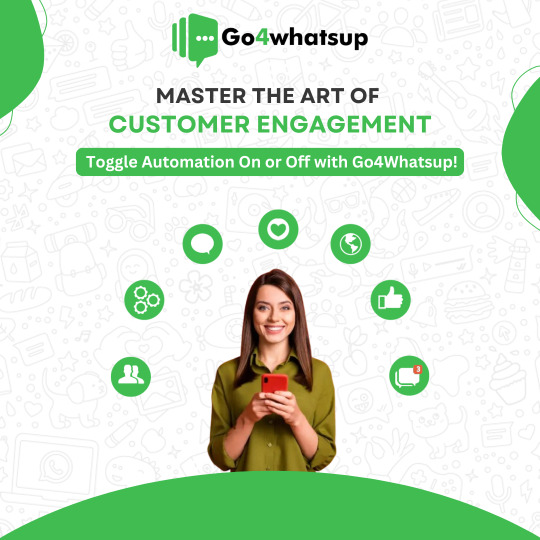
Transform how your business communicates with Go4Whatsup's WhatsApp Business API! Whether you want to automate responses or switch to manual mode, you’re in control. Save time, reduce costs, and keep your customers engaged like never before. Designed for UAE businesses, our solution ensures seamless communication with clients, driving growth and satisfaction. Join countless SMEs and elevate your customer engagement strategy with Go4Whatsup. The future of business messaging is here—start today!
💼 Get a Free Consultation Today!
🌐 Visit: www.go4whatsup.com
📞 Call Us: 🇮🇳 +91 96675 84436, U🇦🇪 +971 54 508 5552
📧 Email: [email protected]
💬 We’re here to help you take your engagement to the next level! 🚀
#whatsapp business api#whatsapp api#marketing automation tools#whatsapp api provider#whatsapp chatbot#whatsapp chatbots#whatsapp marketing guide#whatsapp crm#bulk whatsapp messaging#whatsapp marketing
0 notes
Text
#AI Factory#AI Cost Optimize#Responsible AI#AI Security#AI in Security#AI Integration Services#AI Proof of Concept#AI Pilot Deployment#AI Production Solutions#AI Innovation Services#AI Implementation Strategy#AI Workflow Automation#AI Operational Efficiency#AI Business Growth Solutions#AI Compliance Services#AI Governance Tools#Ethical AI Implementation#AI Risk Management#AI Regulatory Compliance#AI Model Security#AI Data Privacy#AI Threat Detection#AI Vulnerability Assessment#AI proof of concept tools#End-to-end AI use case platform#AI solution architecture platform#AI POC for medical imaging#AI POC for demand forecasting#Generative AI in product design#AI in construction safety monitoring
0 notes
Text

Mastering Marketing with MarTech Tools
This infographic highlights the Key Types of MarTech Tools you need to master: 📈 Analytics: Understand user behavior with tools like Google Analytics. 🤖 Automation: Simplify workflows with platforms such as Zapier. 👥 CRM: Build lasting customer relationships using Salesforce. 📱 Social Media Management: Schedule and manage content seamlessly with Hootsuite or Buffer. Stay ahead in the marketing game with these tools that enhance efficiency and boost results.
#MarTech Tools#Marketing Strategies#Digital Marketing Essentials#CRM for Business#Social Media Tools#Automation in Marketing#Analytics Insights#Data-Driven Marketing
0 notes
Text
Streamlining Operations with PDQ Docs: The Best Document Generation Software for Small Business
In today’s fast-paced business environment, efficiency and accuracy are key to staying ahead of the competition. Small businesses, in particular, need reliable tools that can automate processes, save time, and reduce human error. One such essential tool is document generation software, which helps small businesses create documents quickly and accurately. PDQ Docs offers an intuitive solution for small businesses looking to streamline their operations and improve productivity.

What is Document Generation Software and Why is it Essential for Small Businesses?
Document generation software is a tool that automates the creation of business documents, such as contracts, invoices, proposals, and reports. By using templates and pre-filled data, businesses can quickly generate accurate and professional-looking documents without having to manually input information each time. This not only saves valuable time but also reduces the chances of errors that could lead to costly mistakes.
For small businesses, time and resources are often limited. Document generation software for small business provides an efficient way to handle repetitive tasks, allowing businesses to focus more on growth and customer service. PDQ Docs, in particular, is designed to meet the needs of small business owners by offering a user-friendly interface, customizable templates, and seamless integration with other software tools.
Why PDQ Docs is the Best Document Generation Software for Small Business
PDQ Docs, the best document generation software for small business, offers a wide range of features that can help automate and simplify document creation. One of the key benefits of PDQ Docs is its simplicity. The software is easy to use, with an intuitive design that allows users to create documents in just a few clicks. There’s no need for extensive training or technical expertise, making it accessible to small business owners and their teams.
Another significant advantage of PDQ Docs is its flexibility. The software offers customizable templates, which means you can tailor the look and feel of your documents to match your brand identity. Whether you need to generate invoices, contracts, or marketing materials, PDQ Docs ensures that every document reflects your business’s professionalism and style.
Save Time and Reduce Errors
One of the most significant advantages of PDQ Docs is the amount of time it saves. Small business owners often juggle multiple tasks, and manually creating documents can be time-consuming and prone to errors. PDQ Docs automates much of the document creation process, so you can generate accurate, professional documents in a fraction of the time.
Conclusion
PDQ Docs is the ideal document generation software for small businesses looking to streamline their operations and improve efficiency. Its ease of use, customizable templates, time-saving automation, and seamless integration with other tools make it a powerful solution for businesses of all sizes. By using PDQ Docs, small business owners can focus on what matters most: growing their business and serving their customers.
#document generation software for small business#document automation software#small business document management#customizable document templates#automated document creation#business document generation tools#template based document software#invoice and contract generation software#esignature solutions for small business
0 notes